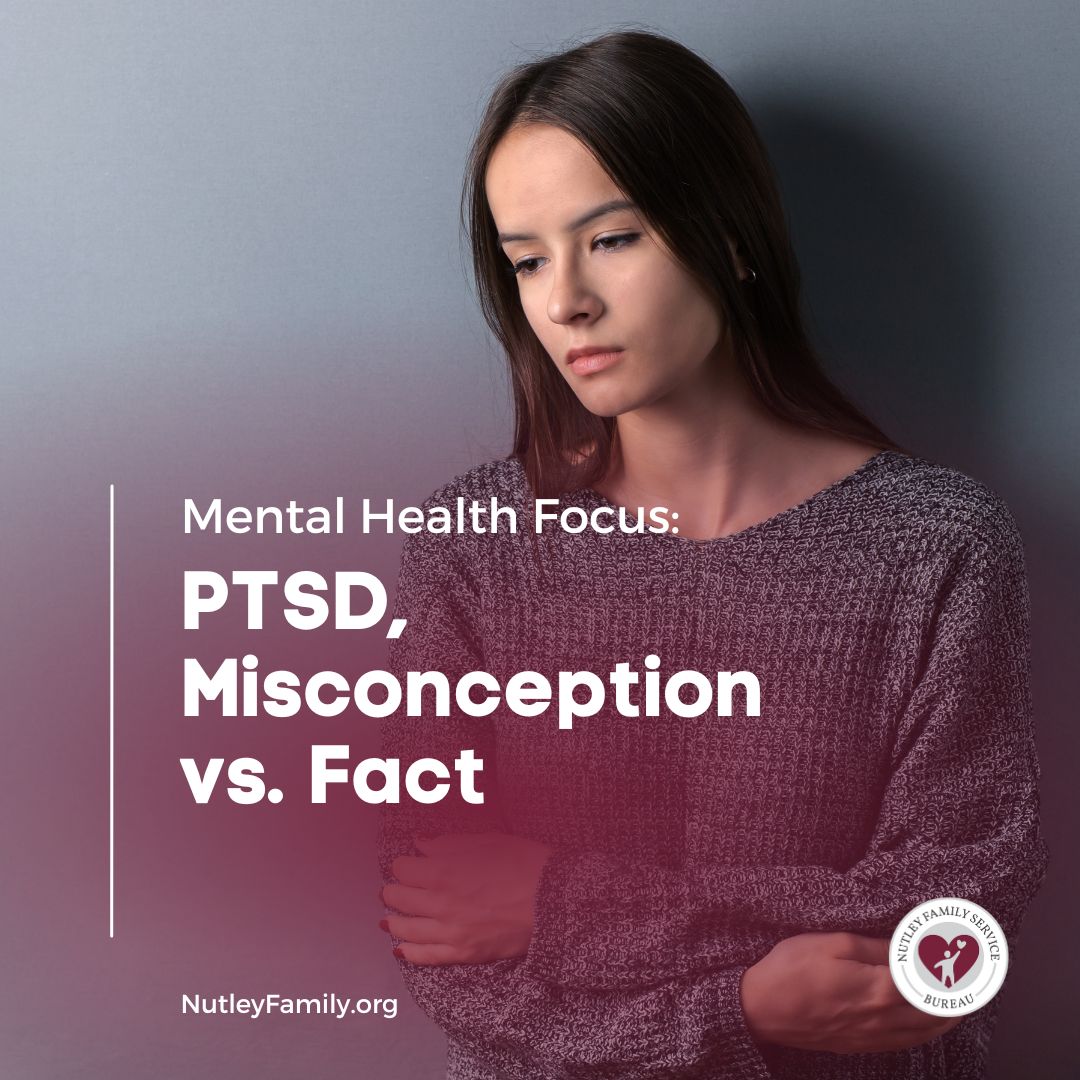-
Mental Health Focus: PTSD, Misconception vs. Fact
- Posted on March 12, 2024
- by admin
- in All Articles, Mental Health, NFSB Blog
- Comments Off on Mental Health Focus: PTSD, Misconception vs. Fact

The Mental Health Program at Nutley Family Service Bureau (NFSB) provides counseling and psychiatric services for individuals and families. New clients are welcome and immediate in-person and telehealth appointments are available. This article is part of an ongoing educational series focused on common mental health challenges, treatment techniques, and helpful tips.
Most people associate post-traumatic stress disorder (PTSD) with intense trauma, like a bad car accident, a natural disaster, or a violent act. The horrors of war are known to cause PTSD among military personnel. However, PTSD isn’t just triggered by a single event, as we’ll discuss in this article.
The good news is that PTSD can be treated regardless of cause, and the feelings associated with PTSD don’t have to stay with you for the rest of your life.
Let’s take a look at the definition and triggers of PTSD, common misconceptions and symptoms, and steps you can take to alleviate the symptoms of PTSD.
What is PTSD?
PTSD is a mental health disorder caused by experiencing or witnessing a traumatic event. However, PTSD can also be caused by recurring, prolonged trauma, often from childhood.
“When a person experiences multiple traumatic events on a consistent basis, particularly from a highly dysfunctional upbringing, these events can trigger PTSD,” said Kelly Rivadeneyra, LCSW, Assistant Director of the Mental Health Center at NFSB. “Any form of abuse or neglect when repeated over a long period of time can cause PTSD, and with more wide-ranging effects.”
PTSD is a serious, complex condition that can trigger feelings of hopelessness as people wonder if they’ll ever get better.
What are common misconceptions about PTSD?
The most common misconception about PTSD is that the condition is caused by a single, intensely traumatic event. For many people with PTSD, their struggle is the cumulative effect of many years of negative experiences, which can produce feelings that are just as painful.
“Growing up in severe poverty can be traumatic for a child,” Kelly said. “Children may experience daily stress, uncertainty, hunger, or even fear in an environment that should feel safe. PTSD can also be the result of emotional neglect. While a child may not have been abused, the parents or caregivers may have been very dismissive of the child’s needs instead of offering the support a child needs.”
Individuals with PTSD may blame themselves and say, “Why can’t I just get over this? I should be able to move on.”
While every individual has the power within them to overcome the negative feelings that contribute to PTSD, many people need additional support and guidance to navigate that process, and that’s okay. That’s what counselors at NFSB are here for.
What are common symptoms of PTSD?
The most well-known symptoms of PTSD involve flashbacks, nightmares, and intrusive thoughts about traumatic experiences, as if they were happening again. This can be accompanied by or result in many unpleasant symptoms, including but not limited to:
- Anxiety
- Poor sleep
- Poor appetite
- Low energy
- Migraines
- Fatigue
- Irritability
- Self-harming behavior
“PTSD can also make it difficult for people to trust others, which can lead to depression, isolation, and relationships problems,” Kelly said. “We’ve seen people with PTSD who are unable to regulate their behavior or protect themselves. This can lead to risky or even dangerous behavior.”
What should you do if you suspect you or a loved one has PTSD?
The first step is to recognize that you need support. Time is not treatment. Nobody should try to simply “push through it.” Help is available, whether you choose to seek support from a loved one or a professional counselor at NFSB.
“I always work with clients to get to know their symptoms better,” Kelly said. “Try to find out what your triggers are. Become aware of what you’re experiencing and how it’s affecting your life. Then we can determine the best path forward with greater clarity.”
Trauma that triggers PTSD is very much mental, emotional, and physical. Grounding and relaxation strategies can help you remain calm while processing the trauma of past experiences. Self-care, including body movement, exercise, healthy eating, and regular sleep habits, can improve your physical and mental strength and resilience.
Of course, counseling can help you identify the underlying causes of PTSD, process those feelings, and learn new coping mechanisms.
For example, cognitive behavioral therapy can help you reframe negative thoughts and change behaviors that are associated with your trauma. Depending on the severity of symptoms, medication may be recommended to alleviate symptoms, promote better sleep, and help you feel more in control of your feelings and behavior.
Remember, PTSD does not have to stay with you forever. Help and treatment are available!
If you or someone you know is showing symptoms of PTSD, we’re here to help. Schedule an appointment at NFSB. New clients are welcome and immediate in-person and telehealth appointments are available. English- and Spanish-speaking counselors are ready to help and we’ll always respect your privacy. Call 973-667-1884 extension 1.
If you enjoyed this article please consider sharing it!

















